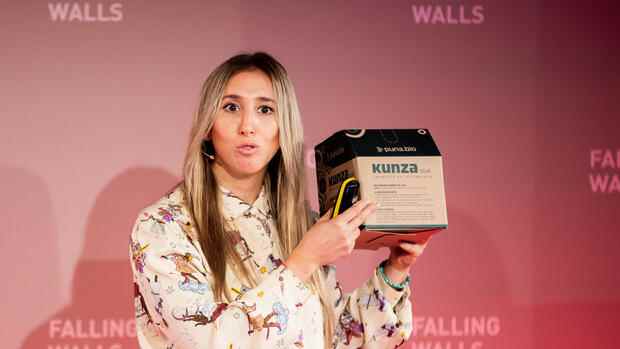Berlin The science summit “Falling Walls” in Berlin is a showcase for research projects. The event brings together scientists whose technology could solve major environmental and social problems and who want to take their work from the lab to the market. The scientific breakthrough of the year is awarded. And the field of participants is strong.
The biologist Christopher Landowski from the Finnish start-up Onego Bio is developing a process for obtaining protein – using bacteria instead of chickens. Chemist Stafford Sheehan is working with the start-up Air Company on using CO2 to produce jet fuel. And Marek Checinski wants to use C1 Green Chemicals to produce emission-free, so-called green methanol as a substitute for crude oil.
The summit gives an insight into the often hidden world of cutting-edge research. Only scientific breakthroughs, such as the mRNA technology of the Covid vaccines, find a broad public.
However, there are numerous leading research locations in Germany that promote innovations and revolutionary processes, often without the hoped-for attention. There is also hope that a generation of founders will be recruited from the universities and colleges.
Top jobs of the day
Find the best jobs now and
be notified by email.
But all too often scientific studies only turn into paper and prototypes. Or the spin-offs wither away again. Why is that? And how could the number of spin-offs and their probability of success be increased? It’s about nothing less than the country’s technological sovereignty.
The challenge is explaining
“Most business people are generalists,” says Leroy Cronin, CEO and founder of startup Chemify. No matter how good an idea may be, if potential customers and investors don’t understand it, a spin-off is doomed to fail.
His vision: a digital construction kit for molecules and an artificial intelligence that writes the instructions. But getting this complex idea to the businessman or businesswoman: always a small challenge, explains the Briton.
Cronin is Professor of Chemistry at the University of Glasgow. With Chemify he wants to make the production of molecules cheaper, safer and faster. But: “Explaining this concept to people is not that easy,” he says.
Studies see enormous potential – if the funding is right
A well-known credo from the start-up scene is “fake it till you make it”: Here it is perfectly acceptable to make a promise that a young company can only actually fulfill later. That collides with the rules and demands of science, explains Elisa Bertini, co-founder of the Argentine start-up Puna Bio. The chemist says: “We researchers are perfectionists; CEOs are pragmatists.”
Cooperation often requires concessions from both sides. At Puna Bio, the three scientific founders are supported by a business economist.
Fridtjof Detzner is the founder of the venture capital firm Planet A Ventures.
(Photo: Falling Walls Foundation/Christoph Soeder)
A ray of hope: more and more start-up centers at universities are taking on the topic and trying to bring scientists and business economists together. There are workshops in business management for academics – and private business schools refer graduates to the research institutes in search of business ideas.
Maximilian Eckel is head of the start-up center at WHU, the Otto Beisheim School of Management in Vallendar. Young researchers focus on the career path in research and teaching – too often they don’t look at the chances of founding a company, he says: “It is therefore important to show people what this step could look like,” says Eckel.
He knows the opportunities for his own graduates just as well: A study by the management consultancy McKinsey assumes that such initiatives could produce start-ups worth 500 billion euros by 2030.
Quantum computer start-up wins award
Venture capitalists are showing great interest in start-ups in areas such as technology, healthcare and recycling. But there are hurdles.
A survey by venture investor Atomico shows that actual investment in these areas is well below the number of business angels who have shown interest. Only start-ups from the fintech sector are nevertheless in demand and fully financed.
This may be due to the fact that venture capital firms still have to build up know-how in various scientific areas themselves. One investment firm that has done this from the start is Fridtjof Detzner’s Planet A. On the one hand, he makes targeted investments in start-ups that can seriously address the climate goals. On the other hand, he knows that if the scientific core is bad, even the best business shell won’t help.
The investor says: “We have to make sure that the start-ups we invest in are really significantly better than the competition.” “ have to give like the economists.
This is how Detzner came to Traceless. The Hamburg start-up around bio-engineer Anne Lamp won the “Breakthrough of the Year” award at the Falling Walls summit last year. This year, the quantum computer company Qphox received the award. The Dutch are working on modules, the quantum computers to connect via light signals.
One start-up from Detzner’s portfolio has at least made it to the finals this year: C1 Green Chemicals with its petroleum substitute made from methanol. “If methanol is green, then 80 percent of organic chemical products can be produced via this route,” says founder Marek Checinski in Berlin.
More: 30 percent fewer start-ups – only one industry is developing positively
